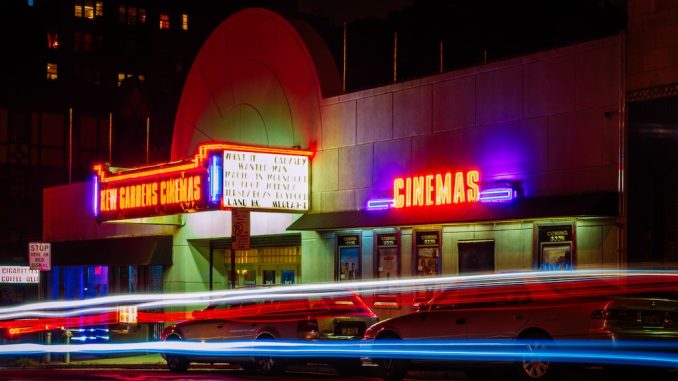
Sound of Freedom was a massive surprise hit for upstart production company Angel Studios.
The success of the Jim Caviezel-led low-budget blockbuster has garnered a lot of attention and interest in the studio’s subsequent projects.
But the studio behind Sound of Freedom just missed the mark on what could have been the most inspirational message of the year.
Bonhoeffer: Pastor. Spy. Assassin is in theaters now
Angel Studios is getting rave reviews for their latest movie.
Bonhoeffer: Pastor. Spy. Assassin, chronicles the life of a German pastor who stands up to Adolf Hitler and the Third Reich.
All of the advertising for the movie – including the official trailer – promises movie goers a suspense thriller about the real-life Dietrich Bonhoeffer, one of the true unsung heroes of World War II.
“When a pacifist is called to a political act that could change the course of history, how will a man of honor respond,” the movie’s synopsis reads. “This is the true story of Dietrich Bonhoeffer, a man who preached love while plotting the assassination of an evil tyrant. With world-shattering stakes, Bonhoeffer begs the question, how far will you go to stand up for what’s right?”
With a description like that, audiences were conditioned to expect a great caper case.
And those audiences are giving Bonhoeffer glowing reviews.
The movie has a 4.5 out of 5 rating on Goggle and an 82% audience score on Rotten Tomatoes, while critics rate it at 71% fresh.
But after viewing the film, it’s difficult to see why.
Angel Studios didn’t deliver on its promise
To be fair, the audience score on Rotten Tomatoes is trending down quickly as more people outside of Angel Studio’s “Angel Guild” membership platform see the movie.
That may be because the movie fails to deliver on its promise.
Bonhoeffer: Pastor. Spy. Assassin almost entirely focuses on the “pastor” part of that title, with little time or attention spent on the “spy” or the “assassin.”
The movie delivers little in the way of thrills and suspense such a title would suggest.
Instead, it plays out like a slow-moving, confusingly-told biopic.
Director Todd Komarnicki of Elf and Sully fame chose to tell the story in flashbacks, slowing the movie down to a dull crawl.
In real life, Pastor Bonhoeffer stood up to the Church of Germany, spied on the Nazi’s, saved the lives of many concentration camp victims, and was an integral part of a failed assassination plot against Hitler.
But the first third of the film’s 2-hours and 12-minute runtime is spent diving into Bonhoeffer’s familial relationship and his time in Harlem for Seminary.
Instead of focusing on the details of the assassination plot, or building suspense around the pastor getting caught while he infiltrated the Nazi regime, viewers are treated to a long look at how Bonhoeffer fell in love with jazz music.
The second third follows the pastor’s return to his homeland where he learns about Hitler’s takeover.
In this section of the movie, the Bonhoeffer character comes off as quite the little complainer – a lot of talk, very little action.
Though that critique largely summarizes the movie.
It’s just boring – there’s a lot of speeches, but not much happens, violating the first rule of visual medium – “show, don’t tell.”
For example, the film is heavy handed with several characters frequently telling Bonhoeffer how “brave” and “courageous’ he is.
But the characters shouldn’t have to tell him that for the audience to get the message.
His acts and behaviors of Bonhoeffer on screen should lead viewers to come to that conclusion on their own, without constantly being beaten over the head with the on-the-nose dialog.
And unfortunately, the pace doesn’t pick up much for the final third of the film, when the spying and attempted assassination occur.
During the spying portion, Komarnicki never builds any sense of real threat that Bonhoeffer will be caught.
And the assassin comes and goes almost as an afterthought.
The audience isn’t brought into the planning in any meaningful way – and the failed assassination passes in a moment’s notice with no build up.
What might have been . . .
But boredom isn’t the worst of the problems with the movie.
The biggest issue with Bonhoeffer: Pastor. Spy. Assassin is the missed opportunity.
There is a lesson in Bonhoeffer’s story that goes beyond the obvious “the Holocaust was bad” angle.
Bonhoeffer stood up for what he believed in and put action behind his words.
The German pastor would have never abided by the modern belief that one should “never talk about religion or politics.”
Those are the subjects that matter for society and human thriving – they’re the topics that need to be discussed and debated, and Bonhoeffer knew this.
Far too many Christians believe it’s good to be Christian as long as they sit politely in the corner and keep it to themselves.
But doing so runs in direct opposition to Christian values.
Christians are called to strive to live as Godly as possible and bring people to Jesus.
You can’t do that if you want to “be polite” and respect supposed “preferred pronouns,” and not judge hedonism and depravity.
Bonhoeffer: Pastor. Spy. Assassin, could have been a clarion call to Christians to step up their game – much like the titular character did.
Instead, audiences got a boring biopic talking about the bold stand that the Holocaust must never be allowed to happen again.
Missed opportunity from Angel Studios.

